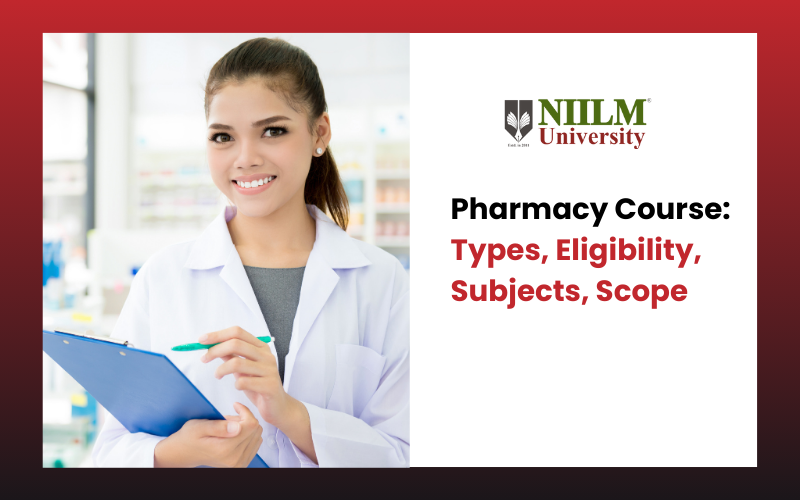Admission Enquiry

Explore the many kinds of pharmacy courses, their conditions, the topics they cover, and the immense possibilities in the pharmaceutical sector.
Pharmacy, the science of medicine and healthcare, provides a variety of educational options, each with a unique focus and professional path. For those hoping to make a career in this dynamic field, it is essential to comprehend the subtleties of pharmacy courses, from eligibility requirements to course frameworks. This guide will walk you through the different course options, requirements, topics addressed, and opportunities open to pharmacy graduates. It will also provide you with insight into a field that combines scientific rigor with a significant impact on public health.
Pharmacy courses cover pharmaceutical sciences, preparing students for roles in drug discovery, development, distribution, and patient care. Topics include clinical pharmacy, pharmaceutics, pharmacognosy, and pharmaceutical chemistry. Offered at diploma, undergraduate (B.Pharm), postgraduate (M.Pharm), and doctoral (Pharm.D) levels, these courses equip graduates for diverse career pathways in the pharmaceutical and healthcare industries. Graduates contribute to public health, ensure safe drug use, and drive medical innovation.
Bachelor of Pharmacy (B.Pharm): An undergraduate program spanning four years, providing foundational knowledge in pharmaceutical sciences, pharmacology, pharmaceutics, and pharmaceutical chemistry. Prepares graduates for roles as pharmacists in various settings.
Diploma in Pharmacy (D.Pharm): A two-year curriculum focusing on pharmaceutical chemistry, pharmacy practice, and pharmacology—the basic areas of pharmacy. Graduates frequently work as assistants or technicians in pharmacies.
Master of Pharmacy (M.Pharm): A postgraduate course that offers concentrations in pharmaceutical chemistry, pharmacognosy, pharmacology, and pharmaceutics. trains graduates for jobs in industry, academia, and research.
Doctor of Pharmacy (Pharm.D): A PhD program designed to create highly skilled clinical pharmacists who can manage pharmaceutical therapy and provide patient-centered care. integrates classroom instruction with hands-on training throughout six years.
Eligibility criteria for a pharmacy course typically vary depending on the country and the specific institution offering the program. However, some common eligibility requirements may include:
Educational Background: The majority of pharmacy programs mandate that candidates have either finished high school or its equivalent. Additionally, some could insist on taking particular high school courses, like chemistry, biology, and math.
Academic Performance: A minimum grade point average (GPA) or test results from standardized assessments (SAT, ACT, etc.) are frequently mandated for applicants.
Language Proficiency: For international students, proof of English language proficiency through tests like TOEFL or IELTS may be required, especially if English is not their first language.
Entrance Exams: Many pharmacy schools require applicants to take a standardized entrance exam, such as the Pharmacy College Admission Test (PCAT) in the United States.
Letters of Recommendation: Applicants to certain pharmacy programs could be asked to provide letters of recommendation from instructors, employers, or other people who can vouch for their moral integrity and academic prowess.
Pharmaceutical Chemistry: The study of pharmaceutical substances' production and chemical properties, especially those of medications and their formulations, is the main emphasis of this discipline. The phenomena of organic and inorganic chemistry as they relate to drug synthesis, analysis, and design are taught to students.
Pharmacology: Pharmacology is the study of how medications affect living organisms. Students study the effects, interactions with living things, medicinal applications, mechanisms of action, and actions of drugs.
Pharmaceutics: Pharmaceutics is concerned with the formulation, manufacture, and delivery of pharmaceutical dosage forms. Students learn about the principles of dosage form design, drug delivery systems, and factors influencing drug release and absorption.
Pharmacognosy: Pharmacognosy involves the study of medicinal plants and natural sources of drugs. Students learn about the identification, extraction, isolation, and characterization of bioactive compounds from plants, animals, and microorganisms.
Clinical Pharmacy: Clinical pharmacy focuses on the application of pharmaceutical knowledge and skills in patient care settings. Students learn about medication therapy management, patient counseling, drug utilization reviews, and evidence-based practice in healthcare.
Pharmaceutical Biotechnology: Pharmaceutical biotechnology involves the application of biotechnological techniques in drug discovery, development, and production. Students learn about recombinant DNA technology, biopharmaceuticals, gene therapy, and bioprocess engineering in the pharmaceutical industry.
Clinical Pharmacist: Clinical pharmacists work in hospitals, clinics, and other healthcare facilities, providing direct patient care, medication counseling, and monitoring for drug-related problems.
Community Pharmacists: They work in retail pharmacies, providing pharmaceutical care services, managing prescription medications, and promoting health and wellness within the community.
Pharmaceutical Industry: Graduates can work in pharmaceutical companies in roles such as drug formulation scientist, regulatory affairs specialist, pharmacovigilance officer, and medical affairs manager.
Academic and Research Institutions: Pharmacy graduates can pursue careers in academia and research institutions, contributing to advancements in pharmaceutical sciences and healthcare. They can work as professors, researchers, or scientists, conducting research, teaching students, and disseminating knowledge in various fields of pharmacy.
Pharmacy graduates with entrepreneurial aspirations can establish their own pharmacies, pharmaceutical consulting firms, or healthcare startups.
In conclusion, pharmacy courses offer diverse paths for students to gain expertise in pharmaceutical sciences and healthcare. Whether pursuing a B.Pharm, D.Pharm, M.Pharm, or Pharm.D, graduates are equipped for impactful careers in medication management, research, and patient care. With high demand across sectors, pharmacy education remains essential for meeting society's evolving healthcare needs.
Q1. What is the duration of a B.Pharm course?
A1. B.Pharm is typically a 4-year undergraduate program.
Q2. Can I pursue an M.Pharm after completing my B.Tech?
A2. Yes, but you may need to fulfill additional prerequisites depending on the university.
Q3. What is the difference between D.Pharm and B.Pharm?
A3. D.Pharm is a diploma course of shorter duration focusing on pharmacy basics, while B. Pharm is an undergraduate degree offering a broader curriculum.
Q4. Can I pursue a pharmacy course online?
A4. Yes, there are online pharmacy courses available, but practical training may be required for certain aspects of the program.
Q5. Can pharmacy graduates work abroad?
A5. Yes, pharmacy qualifications are recognized globally, enabling graduates to work internationally with appropriate licensure.
Copyrights © 2024 NIILM UNIVERSITY. All rights reserved.